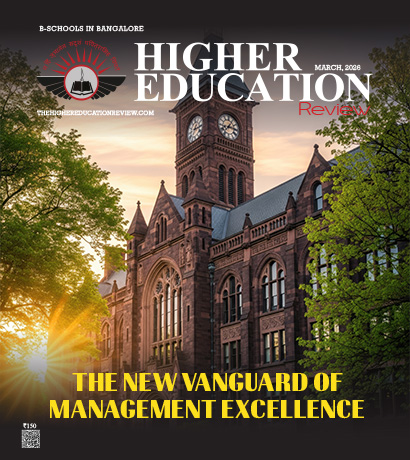Key Strategies for Nailing Your Interview and Securing the Job
 In an interaction with Higher Education Review, Ruchi Mago, Head HR, Orange Business India, shared her expert knowledge about the changing nature of interview preparation in today's hybrid workplace. She emphasized the growing importance of researching company culture, aligning personal values with organizational goals, and adapting to virtual interview formats. Ruchi also highlighted how authenticity, clarity, and a problem-solving orientation are needed to stand out and be successful in the current job market.
In an interaction with Higher Education Review, Ruchi Mago, Head HR, Orange Business India, shared her expert knowledge about the changing nature of interview preparation in today's hybrid workplace. She emphasized the growing importance of researching company culture, aligning personal values with organizational goals, and adapting to virtual interview formats. Ruchi also highlighted how authenticity, clarity, and a problem-solving orientation are needed to stand out and be successful in the current job market.
How important is researching the company and understanding its culture when preparing for an interview?
An important part of interview preparation is researching an organization and understanding its culture. Another important consideration is the alignment between the person and the organization. It’s important to find the right person for the right job; no one is perfect, and there’s no such thing as a good or bad candidate. What truly matters is how well a person fits with the organization’s values, principles, and fundamentals.
The candidate's values must align with the mission and vision of the organization. A strong sense of purpose greatly influences the current generation's career decisions. They will seek organizations that are connected to their values and goals. They look for companies that can connect to their values and ambitions. The work area is no longer a place to just work; it must be a place where someone can thrive and align their work with their overall purpose. Further researching the company's core values and culture will also benefit the candidate.
Thorough research also signals to the interviewer that the candidate is serious about the opportunity, reflecting commitment, dedication, and determination. In a sea of candidates, standing out is vital, and good research can make a significant difference. Quoting relevant insights from executives or sharing information from social media can leave a lasting impression.
Ultimately, without research, it’s like missing the bus. Candidates who take the time to understand the company are better positioned to showcase their unique fit and make a memorable impact in the interview.
Call for action: "Thoroughly research the company and its culture to showcase your genuine interest, align your values with theirs, and confidently demonstrate why you're the perfect fit—because preparation is the key to standing out and making a lasting impression."
As companies evolve, interviews are increasingly shifting to virtual and hybrid formats. What unique challenges do these formats present, and how can candidates excel in virtual interviews?
The COVID period has brought a lot of virtual interview formats. Virtual interviews possess unique challenges and opportunities. A challenge in virtual and hybrid interviews is the absence of a personal connection; it can be challenging to build a personal connection through screen. Another issue is the attention span and engagement levels - the attention span tends to drop very quickly in virtual settings.
According to research, the average attention span in a virtual meeting is roughly 10 to 15 minutes and several distractions can occur, making it challenging for the interviewer to have a meaningful conversation. Furthermore, it can be difficult to read nonverbal cues during virtual interviews because body language plays a big role in determining how interested and enthusiastic both parties are.
Performing well in a virtual interview requires clear, brief, and to-the-point communication. Focusing too much on key points helps to maintain attention, detailed responses may cause the listener to loose focus. The tone should be varied to reflect interest and engagement. Nonverbal cues such as facial expressions, gestures, and posture add impact and clarity during a virtual interview. Also, at the end of an answer, adding a summary always help to highlight the key points.
When an example or personal experience is shared, summarizing the key points ensures clarity and confirms mutual understanding. It further strengthens the key concepts meant to be highlighted. Furthermore, appropriate humor can lighten the mood and bring a sense of lightness to the conversation, enhancing the interaction more engaging and memorable.
It is important to consider various key hygiene factors in addition to time management. Punctuality is essential- joining the interview on time reflects professionalism. Preparation is vital, as well as confirming clear audio by performing a voice check beforehand. Background noise should be removed, lighting must be sufficient, and the internet connection must be stable. A professional background also helps create a favorable impression.
As a quick summary, call for action for you :
- P - Prepare thoroughly (timing, environment, technology)
- R - Read and respond to cues (verbal and nonverbal)
- I - Involve and engage actively
- S - Summarize key points for clarity
- M - Maintain professionalism with a positive attitude and a sense of humor
Navigating virtual interviews requires preparation, active engagement, and effective communication. By focusing on clarity, connection, and professionalism, candidates can turn challenges into opportunities and leave a memorable impression.
What are the most common mistakes candidates make during interviews, and how can they avoid these pitfalls to improve their chances of success?
A common mistake is adopting a people-pleasing attitude rather than being authentic. Authenticity should be prioritized over simply trying to please the interviewer. Research shows that authenticity increases interview success by 50%. Another common mistake made during interviews is the failure to recognize the underlying reason behind the question. It is essential to understand the purpose behind a particular question, recognizing that purpose helps to align the response accordingly.
A lack of consistency in answers can affect both authenticity and credibility. It is important to remain mindful of earlier answers and ensure that subsequent answers are aligned. In addition, insufficient preparation is a significant concern. Understanding the organization's mission and recent developments plays a crucial role in shaping relevant and thoughtful answers. Highlighting personal brand, being aware of your own strengths, and portraying what makes you unique are all crucial during interviews. Candidates who clearly articulate their personal brand are 40% more likely to secure the role.
Be authentic, prepared, and consistent — the keys to interview success!
What strategies can candidates use to tailor their responses to a specific job and effectively highlight their suitability for the role?
One of the methodologies is called a STAR methodology which stands for situation, task, action, and result. While answering questions, it is crucial to talk about the situation, a person's contribution to the entire situation, the actions taken by the person and the result from the scenario. Moreover, it is important to clearly define each person’s role in the situation. Team involvement is helpful, but clearly defining an individual’s effort makes it clear and indicates responsibility.
It is also necessary to talk about failures, as failures are great learning experiences and show honesty and courage. In addition, the job role should be known beforehand. Interviewers also attempt to decide how well the candidate’s future career aspirations match the company’s direction. Companies would prefer those, whose objectives match long-term company growth. Moreover, asking insightful questions in an interview shows interest, curiosity, and involvement. It signifies active participation in a serious conversation.
How can candidates best demonstrate their problem-solving skills during an interview, especially when they have not faced the same challenge in the past?
Attitude is crucial. Although knowledge can be gained over time, companies primarily seek individuals who not only have the necessary skills but also demonstrate a proactive and positive attitude toward facing challenges. Demonstrating problem-solving skills involves explaining proper situations in which problems were identified and solved. When evaluating problem-solving ability, interviewers also try to assess a candidate's curiosity quotient and how open they are to taking calculated risks.
Without direct work experience, real-life examples - whether from personal situations, societal contributions, or collaborative projects can be shared. What really matters is the approach taken to handle the situation, as this shows a person's attitude and problem-solving ability. Equally important is the ability to establish a growth mindset. Showcasing adaptability, a willingness to learn, and a positive outlook reflect a willingness to lead and contribute.
Nowadays, organizations are seeking not just capable executors but also individuals who may grow into future thought leaders. Having a constructive attitude and embracing change in challenging situations are important variables to create sustainable and long-term value.
"Effective responses showcase a proactive attitude, a growth mindset, and the ability to adapt and learn—be curious, ask insightful questions, maintain a can-do attitude, and demonstrate your potential to leave a lasting impression."

